Graham Reid | | 15 min read
John McLaughlin: We Will Meet Again (from the album McLaughlin Plays Bill Evans, 1993)
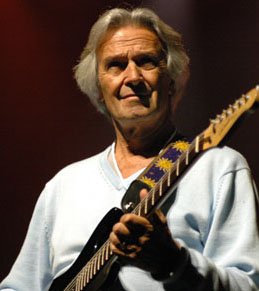
"I'm still at the beginning of my life and career,” says 67-year old guitarist John McLaughlin. “I don’t really think much about what I’ve
done, I don’t have much time to think about what I’ve
done.
“It’s
a worn out phrase, but today is a brand new day and there is a lot to do -- but
the great thing about music is you very quickly learn humility when you are
learning an instrument, because you very quickly see how incapable you are and
how obscure we are about our feelings.
“This
is one of the great lessons that music gives us. It brings us down to our real
size. And it doesn’t ever stop if you are musician,
whether you are 16 or 67 as I am now -- which seems very, very bizarre to me
because I am still 29. We hippies never make it to 30.”
And
the personable McLaughlin laughs very loudly.
While
you can understand where he is coming from in a broadly philosophical sense --
and a conversation with McLaughlin can be very broad and very philosophical --
it is hard to see his career as still at the beginning since it began exactly 60 years ago when an older brother gave him an acoustic guitar.
Encouraged by his mother, an amateur violinist, he took piano lessons at nine . . . . but his musical influences (aside from the epiphany of hearing Beethoven's Ninth Symphony on the BBC) were all blues guitarists. He fell in love with the blues of Muddy Waters and Big Bill Broonzy ("it grabbed me right away, it had a tremendous gravity") and he began learning chords from his older brothers.
He moved on to hard Chicago blues and when he was 14 heard Django Reinhardt and flamenco music.
Jazz started to enter his world (Tal Farlow was my real hero, he told Downbeat magazine in the early Eighties) and discovered Miles Davis albums, then Eric Dolphy and John Coltrane.
He moved to London from his home in Yorkshire and by 1964 he had worked with the jazz wing of the British blues revival as a member of Georgie Fame's Blue Flames, the Graham Bond Organisation (with Jack Bruce and Ginger Baker, later of Cream) and Brian Auger's Trinity.
In the years before the triumvirate of Eric Clapton, Jeff Beck and Jimmy Page brought virtuoso playing into rock in the Sixties, McLaughlin had become a jazz-rock genius, but out on the periphery.
He edged towards the experimental when playing with avant-garde saxophonist John Surman with whom he recorded Extrapolation in 1969, and it was while jamming at Ronnie Scott's club he was spotted by drummer Jack DeJohnette who recommended him to fellow drummer and Miles Davis alumnus Tony Williams.
McLaughlin went to New
York to join up with Williams and organist Larry Williams to form Tony Williams' Lifetime, but within days was playing
on the Miles Davis’s seminal album of 69, In A Silent Way.
He
subsequently played on sessions for the Davis albums Bitches Brew, On The
Corner, Big Fun and A Tribute to Jack Johnson but was also in demand
as a session player (the Stones in rock, Wayne Shorter and others in jazz).
He
launched his solo career with two albums on a label run by the late Jimi
Hendrix’s friend and mentor Alan Douglas. The first of these, Devotion
in 1970, Douglas rightly considers the first jazz-fusion record. Of the second, My Goal's Beyond, Rolling Stone critic Robert Palmer wrote, "His solos on the first side reveal an awesome technique and an over-riding concern with shimmering melodic substance and harmonic ingenuity." (The album was re-issued in the late 80s when Bruce Lundvall established the Elektra-Musician label and grabbed it for his schedule.)
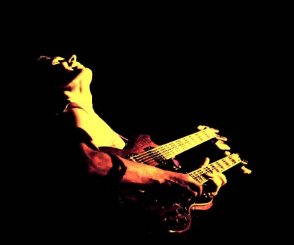
Then
McLaughlin established the Mahavishnu Orchestra in which set brain-finger speed
record for guitarists. This was jazz-rock fusion played with often blinding
intensity and energy, and in the early 90s Douglas observed, “McLaughlin
produced the kind of music that, had he lived, Hendrix might have pursued, a
far reaching spiritual celebration of rock, jazz, blues and Eastern-influenced
sounds”.
Ever
restless, McLaughlin collaborated with Carlos Santana; explored the new possibilities of the guitar synthesiser ("The synthesiser world opens the door to musical infinity," he told Time in 1975; and founded the acoustic
Indo-jazz group Shakti in the mid 70s with tabla player Zakir Hussain.
Critical opinion of their self-titled debut in '75 was divided: Gordon McLaughlin, when faced with the choice of playing the second side or throwing it out the window wrote, "Darn' thing must have sailed 70 yards".
The follow-ups Handful of Beauty ("this music takes you away into a land of the imagination, of bartered energies and climactic euphoria," wrote Downbeat) and Natural Elements ("the third and best Shakti yet, goes beyond anything McLaughlin has done in the past," said Tony Mattson in Craccum) found the guitarist at a career peak. In 1977 Downbeat rated him the fifth top player of the year.
But he was moving on (and back to his early love of flamenco) when he linked up with Paco de Lucia and Al di
Meola for a series of popular flamenco-jazz albums . . .
And
so his long career goes: playing with Indian musicians and jazz giants; playing again with Davis for the
Palle Mikkelborg tribute album to Davis, Aura, in the mid-Eighties; reviving Shakti
to great acclaim as Remember Shakti in the late Nineties; playing tough jazz
and deft acoustic ballads; and now touring in the 5 Peace Band of pianist Chick
Corea, drummer Vinnie Colaiuta, bassist Christian McBride and saxophonist Kenny
Garrett.
But
that is merely scratching the surface because behind that extraordinary breadth
of music is deeply intellectual, spiritually curious man who -- along with
Santana -- became a disciple of the spiritual leader Sri Chinmoy in 1970 (who
gave him the name “Mahavishnu” which means “divine compassion, power and
justice“).
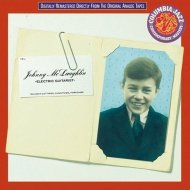
He
parted with his spiritual master in the late 70s and his acclaimed album Electric
Guitarist under the name Johnny McLaughlin (which had his teenage business
card on the cover) marked his coming out. One piece was an inspired reworking of Coltrane's Giant Steps with DeJohnette and Corea, elsewhere he was reunited with Williams' Lifetime, on Friendship he was joined by Santana . . . They were comfortable and relaxed superstar sessions which re-united McLaughlin with figures from his past and lead him out of the cul-de-sac of fusion.
But through his association with his guru and Indian musicians McLaughlin has explored a spiritual dimension in his playing. He also
learned an amusing, self-effacement.
“I
am just a working musician like anybody else and I am painfully aware of my own
incapacities and limitations,” he laughs. “A musician’s life is about that very
recognition. It is dedicated loving work, to quote another hippie phrase, and
that’s as good as it gets.
“When
you play you really have to be ready for, and open to, inspiration because that
really is the moment of truth. In performance inspiration comes, but if you are
not ready then it’s really a waste.
“The
instrument has to be part of your body and it has to be just a natural
extension of you, and in order for that to happen you have to spend hours with
your instrument, it is as simple as that. The instrument becomes part of your
psycho-physical body so when inspiration comes you will not be troubled by some
degree of execution of expression.
“There
should be total and natural free flow -- but inspiration does not come every
day, this happens just several times a year. But the point is to be ready so
that it isn’t wasted. When you are playing with someone and they get
the spirit it is infectious: the other musicians get it, the audience gets,
everybody gets it and this is consummation of music and it is magical in way.
“The
whole thing about inspiration is that it is very mysterious and we have no
control over it, it comes or it doesn’t come. It is up to
it, whether it decides to pay a visit at a particular moment.
“It
sounds very Biblical, doesn’t it? I don’t
want to sound Biblical, but music is truly the language of the spirit.”
And
understanding this language and how to use it can be complex, as is listening
when you are a musician.
“When
I listen to music as a musician I listen on several different levels at the
same time, or rather several aspects. One is just the enjoyment of the person’s
playing, and secondly you naturally analyse at the same time as enjoying. So
there are several different functions moving simultaneously.
“When
I’m listening to what’s
going on inside of me or I start playing -- in addition to the phrasing which
modifies according to the way you feel and is very indicative of your state of
consciousness, you could call it a more sensual/physical side -- there’s
the intellectual side where for example you think about what extent
harmonically you can bring in elements.
“Any
note can follow any note so the question is ‘which
note?’, and that is guided by your taste in harmonics and in a
way we do what is done in art as in music, it is the question of how do you
taste it? People taste it how you taste it when you play it.
“When
I am working, it is how to do you from A to B to C while reviewing how you perceive
and how you can reveal harmonic relationships.
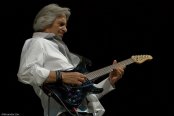
“Harmony
is part of the way of Western way of music and I am a Western musician --
despite all my work with the Indian musicians, which I will continue until I
give up the ghost. But the harmonic side fascinates me more than the linear
way, ‘how you can reveal different harmonic extensions in a linear sense while
not losing the fundamental colour of the music?’. “
To
hear McLaughlin -- who studied under Ravi Shankar, worked alongside numerous
Indian musicians and had guitars built to play more effectively using Indian
microtones -- describe himself as a “Western musician” is something of a
surprise. Surely, given the flamenco influence in some of his work, “world
musician” might be more appropriate.
“That’s
sweet of you,” he laughs, “but I don’t even think of
myself in any terms, I am just a working musician.”
What
draws McLaughlin from jazz to Indian music and back again is the common ground
of improvisation in both spheres. This is challenge, the be both composer and
performer in an instant, but he also sees that is a necessary part of daily
life.
“I
think this is one of the great lessons of life: when we are spontaneous is when
we are most ourselves and the most honest, we are natural and don’t
have time for artifice to come in the way.
“In
improvisation we don’t have to time to think, just play.
That’s the greatest moment because I believe if you are thinking you are not
really playing, and if you are playing you are not really thinking. This is the
ideal place to be in music, where you play you just be.
“There
is a lot to do every day because I am not the same today as I was yesterday. In
that sense every day is new and a challenge, and because I’m
a little different from yesterday - which is very small but over six months it
can be quite substantial -- and the way you perceive music evolves and with
your evolution and the music reflects that.
“The
work is keeping up with what’s going on inside of
you, that’s what my work is. I hear what is going on in my own mind
and have to keep up with that.”
Not
that McLaughlin is any kind of ascetic. The self-confessed Francophile has
lived in Monaco for over 20 years and enjoys skiing in the nearby Alps, or
popping over the border to enjoy the delights of Italy. He also has a family
but is cautious about what how much expectation to put on children, especially
as he has seen pushy parents up-close.
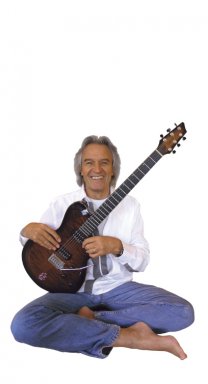
“I
have two boys and neither are musicians although the younger one might get to
it. I’ve seen children ruined by parents’
ambitions, on a couple of occasions quite tragically. So I am not interested in
forcing music on anyone because I saw these children revolt against this kind
of pressure.
“Human
nature is what it is and parent have stars in their eyes if their children have
talent. They live their vision through their kids. I don’t
try to push it on mine.
“Music,
my wife and I, agree should be part of any child’s
education until say 17 or 18, not that they should be obliged to learn an
instrument, but to know music and have the possibility of being and of having
access to instruments. Just like you learn French or English or mathematics, I
think it should be part of any curriculum, it’s
vitally important to the individual.”
And
while placing personal emphasis on the importance of being in The Moment, he
also takes the long view of his life.
“I
am an extremely fortunate person, I think being a musician is a great privilege
for a human being. To be involved in such work is very conducive to interior
development and it’s a wonderful force for peace and
love, if I can quote those old hippie values.
“I’m
still an old hippie, very attached to my hippie values.
“But
when I arrived in New York in early 69 it was primarily to play with Tony Williams,
but within two days I was in the studio with Miles, and you couldn’t
get much luckier than that.
“And
touring now with Chick is very significant because it was exactly 40 years when
we met and played together on In A Silent Way. We were neighbours down
in the Chelsea area of New York and we’ve had some white
nights discussing philosophy. He is a very special human being and very special
musician.”
So
of “Johnny McLaughlin, electric guitarist, Railway Cuttings, Sunnyside,
Yorkshire” (as that business card of his youth read) through a spiritual and
musical quest which saw him creating fusion before there was the word for it,
and world music a couple of decades before Womad, it is fair to ask what
McLaughlin has learned in life.
“Hmmm.
I’ve learned that the great supreme and wonderful spirit
that holds the Universe in place, and myself, are basically two aspects of the
one thing. A good lesson, the only lesson, it’s
the only one we have to figure out.
“I
think we continually learn lessons, it depends on how you see lessons. I wouldn’t
want ‘lessons’ to be in any way
negative, I think they are stepping stones to where we go. It’s
like doubt, it is an extremely important element in life without which we’d
never be able to work our way through to any kind of lucidity.”
And
after all this, after the amps have been turned off and the house lights go off
forever?
“I
think it will be a nice vacation,” he laughs. “You don’t
have to work and you can take it easy for a few thousand years. We’re
all on Death Row it’s just a question of time.
“But
we get to a point where we have to take ‘the big sleep‘, as Raymond Chandler
put it.”
CHICK COREA AND JOHN McLAUGHLIN FIVE PEACE BAND REVIEW
Aotea Centre, Auckland, New Zealand, February 22, 2009
They
say never throw anything away, it’ll come back into fashion. Today, many might
be regretting getting rid of their mid-70s fusion albums after this exceptional
concert fronted by two of the mainsprings of that jazz-rock style, keyboard
player Chick Corea and guitarist John McLaughlin.
But
where 70s fusion too often disappeared up its own arpeggios, three decades on
these protagonists brought a wealth of subsequent experience to expand the
parameters while also reigning in the excesses.
This
was -- in places -- fusion, but not as we once endured it.
On
hand with these 67-year olds was a younger generation of players: saxophonist
Kenny Garrett, bassist Christian McBride (who came up through the
neo-conservative 80s but quickly abandoned its constraints) and the
extraordinary drummer Brian Blade.
When
there was fiery dialogue between these players, the enthusiastic audience
witnessed an intuitive, cross-generational conference call which scaled heights
and defied preconceptions.
From
Corea’s richly embellished piano ballad The Disguise full of abrupt
stops and directional changes (propelled by the muscular, musical and deft
playing of Blade) through McLaughlin’s staccato runs, keening notes and
breathtaking fluidity to Garrett’s astonishing, 10 minute flight of piercing
and screaming notes which conjured up the restless spirits of Albert Ayler and
Rahsaan Roland Kirk, this was jazz to be viscerally experienced.
The
assured McBride brought earthy five-string electric bass to McLaughlin’s New
Blues Old Bruise -- he and McLaughlin discreetly drawing the melodic pulse
back to suggestions of a Chicago blues riff -- during which Garrett made
references to North African music in his solo.
And
if Garrett could pull out a biting and astringent tone only to wittily drop in
the melody of Girl From Ipanema, Corea could equally shift from
attenuated lyricism to broad flourishes before handing over to McBride for some
melancholy arco playing on acoustic bass. Blade’s brilliance was everywhere,
and sometimes “out there“.
This
was music made by equals, much of which has been unequalled in this country.
From
new fusion to an overhaul of Jackie McLean post-bop swing on Dr Jackle,
from angular ballads to blues and galloping Latin rhythms, the Five Peace Band
brought lifetimes of experience into the present tense.
And
if at times it was a tense and intense concert -- that Garrett solo will
lingers for years -- then so be it: this was jazz without compromise, invention
without fear, and it was delivered by master craftsmen.

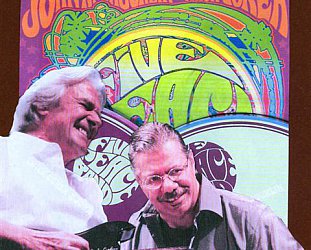
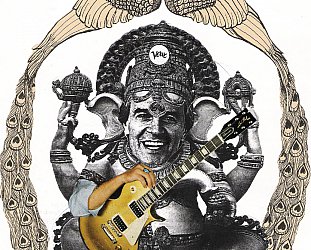
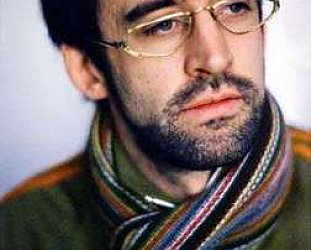
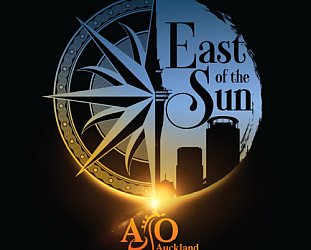
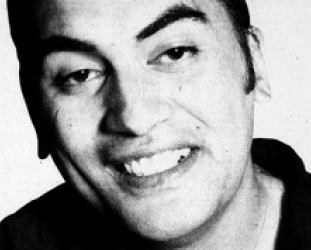
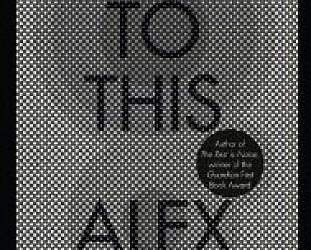
mark robinson - Feb 16, 2009
Excellent Graham. My phone conversation with John ran to only 20 minutes unfortuneatly (don't you hate it when those international voices come back on the line and say "you have 1 minute left").
SaveBut in those 20 minutes we covered off the menaing of life, drugs, the recent Mumbai attacks, our favorite beaches in India, Chic Corea, Miles Davis and crazy drivers in New Zealand (he was almost run over last time he was hear).
An amazing man and musician of course. If you'd like to hear my interview with John (edit down somewhat) with a music bed it is available here...nzjazznetwork.ning.com/
Alan Brown - Feb 23, 2009
Beautifully put Graham. An amazing experience, one that will stay with me for a LONG time... Lyricism, intensity, communication - such a privilege to behold.
SaveIncredible performances from Garrett & Blade, but really, everyone knew how to support and make everyone else sound good. True musicians, true musicality, true passion. Stunning.
post a comment